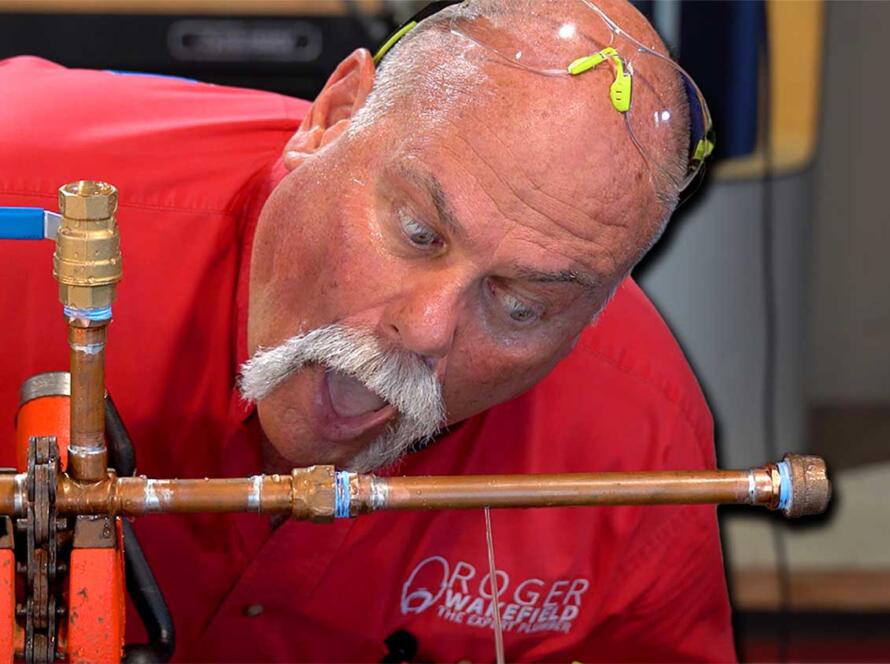When something goes wrong with your plumbing—whether it’s a leaky faucet, a backed-up drain, or a water heater on the fritz—you probably want a professional solution fast. Yet many homeowners dread calling a plumbing company because they’re unsure about fees, service protocols, or the possibility of being overcharged. In the video “What To Expect When Hiring A Plumber,” Roger Wakefield breaks down what a standard, trustworthy plumbing service call should look like. In this blog post, we’ll expand on Roger’s tips, clarifying how you can prepare for the visit, what a professional plumber should do, and why things like service fees and thorough home inspections actually benefit you in the long run.
Understanding Service Fees and Why They Matter
It can feel frustrating when you call a plumbing company and they quote you a service fee just for showing up. But these fees exist for good reason:
- Covers overhead: A reputable company invests in skilled plumbers, trucks stocked with parts, fuel, insurance, and ongoing training. Simply sending a licensed pro to your door costs more than you might think.
- Filters out price-shoppers: If a plumbing company sent someone to every house for free, they’d quickly lose money on “no-commitment” calls. A modest service fee ensures you’re serious about needing a repair.
- Doesn’t fully cover labor: Often, the fee doesn’t even match the total expense of that plumber’s wages, benefits, and truck maintenance. It’s a minimal charge that helps offset some of the cost to get a trained individual on-site.
As a homeowner, knowing that a service fee is a normal part of professional work can help you avoid feeling blindsided. You’re not paying for a free estimate—you’re compensating a skilled craftsperson for travel and diagnostic time. The plus side: once the plumber is there, you get expert advice and a chance to discuss the issue in detail.
First Impressions: Arrival and Appearance
Scheduling the Appointment
A great plumbing company will typically have well-organized call centers or dispatch teams. They might ask for details about your plumbing issue—like whether you’ve noticed leaks before, if your water heater is older, or if you have any current warranty coverage. The more you can share with that initial call rep, the better prepared your plumber will be.
The Arrival
- Parking: A considerate plumber will avoid blocking your mailbox or driveway unless you specifically allow it. If they do pull into your driveway, they should still ensure you can get out if needed.
- Door Knock vs. Doorbell: Roger mentions that many plumbers prefer knocking gently instead of ringing a doorbell, since you might have a sleeping baby or a pet sensitive to that noise. If you hear a soft knock, don’t assume they’re trying to sneak up on you—this is often a courtesy.
- Polite Introduction: Stepping back from the door after knocking is a courtesy signal. You should see the plumber standing at a comfortable distance, typically with tools in hand (or on a rolling mat). Feeling safe and at ease from the moment you open the door is paramount.
Professional Manner: The Credibility Statement
One thing that stands out in Roger’s approach is the idea of a “credibility statement.” A reputable plumber may briefly introduce themselves and their company:
- Personal Background: They might say how they got into plumbing, how long they’ve been in the trade, or why they love their work.
- Company Values: They might share what makes the company unique—like high training standards, comprehensive warranties, or a strong commitment to customer satisfaction.
- Team Culture: Mentioning that they receive ongoing training, support from management, and access to a well-stocked truck can reassure you they have what’s needed to do the job right.
Hearing this up front can put you at ease, knowing that you’re dealing with someone who takes professionalism seriously. If a plumber rushes in without explaining who they are, you might question their qualifications or trustworthiness. The best pros not only know their stuff but make a point to show it in a respectful, personable manner.
Diagnosing the Problem: Clear Communication is Key
Tell the Plumber Everything You Know
Before your plumber starts investigating, give them as much context as possible:
- How the problem started: A slow drip that turned into a constant leak, or a minor clog that suddenly backed up your entire kitchen sink.
- Any previous fixes: If you tried DIY fixes or had another plumber out for the same issue, mention it. Receipts or notes help them see what might have gone wrong or what else needs checking.
- Timeline: If the issue has persisted for weeks, it might have caused secondary damage. If it happened overnight, the plumber knows to look for sudden pressure or temperature changes.
Whole-Home Plumbing Inspection
A thorough plumber will suggest checking your entire plumbing system—not to upsell you on random repairs, but to ensure they see if your current issue is a symptom of something larger. For instance:
- Water Heater Check: If your pipes are rattling, it could tie back to a failing water heater or thermal expansion issue.
- Supply Valves: Old gate valves can freeze up over time, preventing you from shutting off the water in a true emergency.
- Toilet Seals or Flush Valves: A small leak in a toilet tank can eventually drive up your water bill or compromise your bathroom floor.
Don’t be alarmed if they mention a few things that “aren’t broken yet.” They’re simply letting you know items that might fail soon, especially if those parts are old or corroded. You always have the choice to decline additional repairs, but having this knowledge can prevent surprises later.
Presenting Solutions: Options, Not Ultimatums
Once they inspect your problem, a good plumber will propose multiple solutions:
- Critical Fixes: “We need to do this now or you risk property damage or more expensive repairs.”
- Recommended Fixes: “Not urgent, but you’ll save money if you handle it soon. Otherwise, you might face bigger issues down the line.”
- Future Considerations: “This part isn’t failing yet, but it’s near the end of its expected life. Replacing it preemptively might be more cost-effective.”
You shouldn’t feel pressured to say yes to everything on the spot. However, if something is genuinely time-sensitive—like an aging water heater that could burst in your attic—a plumber who fails to warn you wouldn’t be doing their job properly. Transparency is key; they should explain each issue in plain language so you’re never guessing whether you’re being “sold.”
Completing the Job: Cleanliness and Care
Protecting Your Home
Professional plumbers typically use shoe covers or place mats under their tools to avoid scratching your floors. If they have to access a sink cabinet, they’ll lay out a mat or towel to keep your surfaces tidy. Pay attention to whether they handle your belongings gently—moving items aside carefully and restoring them afterward.
Post-Repair Cleanup
When the service is done, the best plumbers clean up the workspace so it looks at least as good as when they arrived. You might see them:
- Wiping up spills
- Vacuuming dust or debris
- Hauling away old fixtures or packaging
Before they leave, they should walk you through what was done, explaining how each replaced component works or if any warranties apply.
Beyond the Repair: Asking for a Review
Many plumbing companies strive for five-star reviews on Google, Yelp, or other platforms. If you’re satisfied with the service:
- Mention the plumber’s name: This can help them earn recognition or a bonus, and it helps the company track which techs excel at customer care.
- Detail the city and the work: For instance, “Joe from ABC Plumbing replaced my water heater in Dallas, TX.” That specificity can help others searching for local solutions.
If you’re not satisfied, speak up before they leave. A reputable company wants a chance to fix any oversight immediately. Open communication can turn a mediocre experience into a great one if the plumber addresses your concerns with integrity.
How Homeowners Can Prepare Ahead of Time
- Secure Pets
A frightened or excited animal can get underfoot, creating stress for both you and the plumber. Keep pets in a safe room or crate. - Clear Access
If you know the plumber needs to get under a sink or into a garage corner, clear out boxes or cleaning supplies. This saves time and prevents accidents. - Gather Information
Locate any old repair receipts or instructions for your fixtures. If you know the brand and model of a faucet, you can provide that detail upfront. - Consider Payment
Some plumbers take cash, check, or credit card. Confirm the acceptable payment methods before they arrive so you’re ready.
Summarizing the Steps of a Good Plumbing Service
- Phone Call: The office takes your details, mentions a service fee, and schedules a time window.
- Plumber Arrival: They park responsibly, knock politely, and maintain a clean, professional look.
- Introduction: A quick credibility statement about their background and the company values puts you at ease.
- Assessment: They inspect the problem you called about and possibly do a broader home plumbing check.
- Solutions: They offer various repair or replacement options, each with clear pricing and urgency levels.
- Authorization: You choose your preferred solution(s).
- Work and Cleanup: The plumber protects your surfaces, performs the fix, and tidies up.
- Walk-Through: They explain what was done and verify you’re satisfied.
- Review Request: They politely ask for an honest online review if you feel you received five-star service.
Following these steps ensures both you and your plumber are on the same page. It also underscores the difference between a licensed, well-trained professional and someone cutting corners.
Why All This Matters
People sometimes assume that calling a plumber is a gamble—maybe you’ll get an honest worker, maybe you won’t. By knowing what to expect and how reputable plumbing businesses operate, you remove much of that uncertainty. You can judge quality based on how respectfully they treat your home, how thoroughly they explain options, and whether they charge fairly for their expertise.
Plumbers who truly care about their craft want you to have the best experience possible. If they’re giving you a clear breakdown of costs, letting you know about potential future issues, and keeping your house tidy, you’re likely dealing with a top-notch service. In contrast, a plumber who rushes in and out, doesn’t check the rest of your system, or shies away from showing their credentials might not be the best fit.
Final Thoughts on Hiring a Plumber
No one wants a plumbing emergency, but if you have one, knowing what to expect can alleviate stress. From the initial phone call to the final cleanup, a professional plumber will communicate openly, show respect for your home, and offer solutions tailored to your budget and needs. Embrace the idea of a service fee as part of quality work, ask any questions you have during the process, and be honest in your feedback afterward. That way, you’ll get the best possible outcome for your plumbing concerns.




